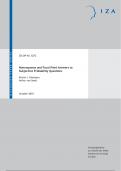SERIES
IZA DP No. 5272
PAPER
Nonresponse and Focal Point Answers to
Subjective Probability Questions
Kristin J. Kleinjans
DISCUSSION
Arthur van Soest
October 2010
Forschungsinstitut
zur Zukunft der Arbeit
Institute for the Study
of Labor
, Nonresponse and Focal Point Answers
to Subjective Probability Questions
Kristin J. Kleinjans
California State University, Fullerton
Arthur van Soest
Netspar, Tilburg University,
RAND and IZA
Discussion Paper No. 5272
October 2010
IZA
P.O. Box 7240
53072 Bonn
Germany
Phone: +49-228-3894-0
Fax: +49-228-3894-180
E-mail: iza@iza.org
Any opinions expressed here are those of the author(s) and not those of IZA. Research published in
this series may include views on policy, but the institute itself takes no institutional policy positions.
The Institute for the Study of Labor (IZA) in Bonn is a local and virtual international research center
and a place of communication between science, politics and business. IZA is an independent nonprofit
organization supported by Deutsche Post Foundation. The center is associated with the University of
Bonn and offers a stimulating research environment through its international network, workshops and
conferences, data service, project support, research visits and doctoral program. IZA engages in (i)
original and internationally competitive research in all fields of labor economics, (ii) development of
policy concepts, and (iii) dissemination of research results and concepts to the interested public.
IZA Discussion Papers often represent preliminary work and are circulated to encourage discussion.
Citation of such a paper should account for its provisional character. A revised version may be
available directly from the author.
,IZA Discussion Paper No. 5272
October 2010
ABSTRACT
Nonresponse and Focal Point Answers to
Subjective Probability Questions*
We develop and estimate a panel data model explaining the answers to questions about
subjective probabilities, using data from the US Health and Retirement Study. We explicitly
account for nonresponse, rounding, and focal point “50 percent” answers. Our results
indicate that for three of the four questions considered, almost all 50 percent answers can be
explained by rounding. We also find observed and unobserved heterogeneity in the
tendencies to report rounded values or a focal answer, explaining persistency in 50 percent-
answers over time. Incorporating rounding and focal answers changes some of the
conclusions about the socio-economic factors that determine expectations.
JEL Classification: C81, D84
Keywords: item nonresponse, rounding, expectations
Corresponding author:
Kristin J. Kleinjans
Department of Economics
Mihaylo College of Business and Economics
California State University – Fullerton
Fullerton, CA 92834-6848
USA
E-mail: kkleinjans@fullerton.edu
*
Kleinjans thanks the Research Fund of Aarhus University for financial support. We would like to thank
Dimitris Georgarakos, Michael Hurd, Pierre-Carl Michaud, Daniel Schunk, Federica Teppa, and
participants at the CeRP Workshop in Turin and the Netspar Pension Workshop in Amsterdam for
helpful comments on an earlier draft of the paper.
, 1 Introduction
Expectations play a crucial role in many economic models. The recent literature on measuring
expectations of individuals proposes to use subjective probability questions (see, e.g., Manski
2004). Answers to such questions are used more and more frequently to understand if
expectations and outcomes are related in a systematic manner, to evaluate if individual
behavior changes in response to changing expectations, and to relax assumptions on
expectation formation in models with forward looking agents.3 This results in an increased
need for a better understanding of response behavior to such questions, especially of item
nonresponse and potential focal point answers.
In this paper, we study the response patterns to four questions about subjective
probabilities in the Health and Retirement Study (HRS). Specifically, we are interested in
disentangling to which extent the observed response patterns are driven by the genuine
underlying probability, by rounding, and by a tendency to give focal point answers.
Moreover, we want to analyze how these tendencies vary with observed and unobserved
characteristics and how accounting for rounding and focal point answers affects the estimates
of the determinants of expectations.
We develop and estimate a panel data model where the response to a question about
subjective probabilities is a two-step process. In the first step, an individual chooses either not
to respond to a question at all, to give a focal point answer unrelated to the probability of
interest, or to give an answer that is the exact or rounded value of the true probability. In the
latter case, the second step determines the degree of rounding and thus the reported answer.
Answers of “50 percent” (50/50 answers) can be purely focal point answers (that is,
essentially equivalent to non-response), as well as the result of rounding.
Item nonresponse to a question can be the result of several underlying causes.4 It can be an
expression of the fact that the answer is not known, that the concept of the answer is not
3
See Bernheim (1990) and Manski (2004) for overviews of subjective expectations and their usage in
economic research, and Dominitz and Manski (2005) for an overview of surveys eliciting subjective
expectations. For an example of research using expectations data to relax assumptions on expectation formation,
see Kapteyn et al. (2009).
4
Our sample is too small to distinguish answers of “don’t know” and refusals. See Shoemaker et al. (2002)
for the differences in determinants of these two types of nonresponse.
2




